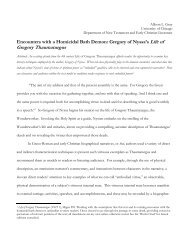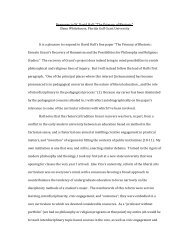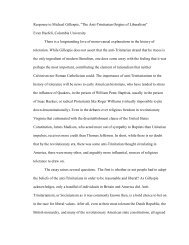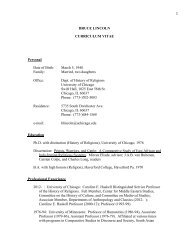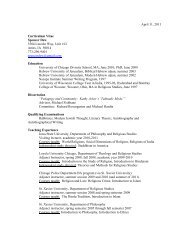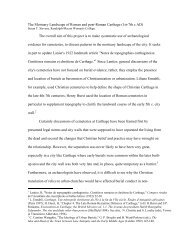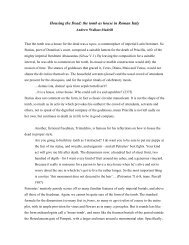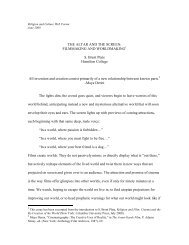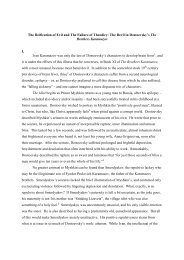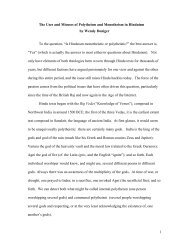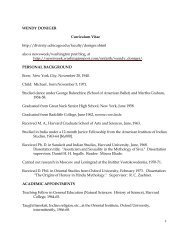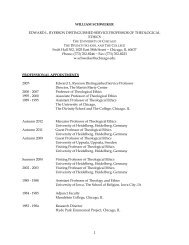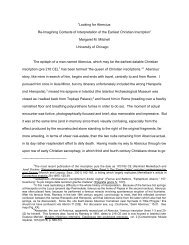*Criterion Winter 02-4.16 - Divinity School - University of Chicago
*Criterion Winter 02-4.16 - Divinity School - University of Chicago
*Criterion Winter 02-4.16 - Divinity School - University of Chicago
Create successful ePaper yourself
Turn your PDF publications into a flip-book with our unique Google optimized e-Paper software.
He indulged a life in the shades <strong>of</strong> gay subcultures in London and Paris that ranged from<br />
friendship with notable artists and public figures to trysts with rent boys . . .<br />
initially, Oscar was delighted at the prospect <strong>of</strong> fatherhood.<br />
But the stark contrast between fantasy and reality intervened.<br />
The aesthetic <strong>of</strong> beauty that had attracted Oscar to Constance<br />
proved an idealization that vaporized as her body changed<br />
its contours. The full import <strong>of</strong> paternity crushed a relationship<br />
that had been based, in large measure, upon the notion <strong>of</strong><br />
wife as accessory—a romantic<br />
fiction that <strong>of</strong>ten resolved itself<br />
when the husband took a mistress<br />
and the wife adopted an<br />
independent life, funded by her<br />
own family resources or her<br />
husband’s guilt, or a combination<br />
<strong>of</strong> both.<br />
The first son was born in<br />
1885, a second son was delivered<br />
a year later, in 1886. Nearly<br />
simultaneous with these events,<br />
Wilde began to act out his homosexuality.<br />
The decade following<br />
his marriage to Constance was<br />
frenetic and productive. He<br />
became a master <strong>of</strong> compartmentalization<br />
and contradiction.<br />
Oscar withdrew more and<br />
more from Constance, though<br />
in the rare times they spent<br />
together he seems to have been<br />
a very caring father to his sons,<br />
spinning stories for them that<br />
were a hybrid <strong>of</strong> fairy tale and<br />
fable. He indulged a life in the<br />
shades <strong>of</strong> gay subcultures in<br />
London and Paris ranging from<br />
friendships with notable artists and public figures to trysts<br />
with rent boys, the name given opportunistic roustabouts and<br />
runaways who turned to prostitution for a living, or at least<br />
a meal.<br />
Meanwhile, in spite <strong>of</strong>—or perhaps because <strong>of</strong>—this<br />
hyperactivity, his pen was prolific. Quitting his editorship <strong>of</strong><br />
14 WINTER 20<strong>02</strong><br />
Women’s World in 1899, in the next six years he turned out<br />
nearly every literary work for which he is now known. The<br />
children’s stories concocted for his boys were gathered<br />
into a volume entitled The Happy Prince and Other Tales.<br />
A volume <strong>of</strong> critical essays entitled Intentions followed and<br />
included The Decay <strong>of</strong> Lying and The Critic as Artist. There<br />
followed The Soul <strong>of</strong> Man under<br />
Socialism. Then came The Picture<br />
<strong>of</strong> Dorian Gray, his masterwork<br />
that shares the best qualities<br />
<strong>of</strong> Henry James, Joseph Conrad,<br />
and a touch <strong>of</strong> Edgar<br />
Allan Poe.<br />
The Picture <strong>of</strong> Dorian Gray<br />
marked a significant turning<br />
point. It began with Wilde’s<br />
deep infatuation with another<br />
aspiring young poet <strong>of</strong> unusually<br />
striking beauty named<br />
John Gray whom Oscar took<br />
to calling Dorian. Clearly there<br />
was a pr<strong>of</strong>ound bond between<br />
the two. It was perhaps Wilde’s<br />
first glimpse <strong>of</strong> what might be<br />
possible in a loving relationship<br />
between two men, a relationship<br />
founded upon more than<br />
sex. But it was only a prelude.<br />
Gray, who eventually entered<br />
the Roman priesthood, was<br />
soon eclipsed by the love that<br />
would alter Wilde’s life forever.<br />
In 1891 Wilde was briefly<br />
introduced to Lord Alfred Bruce<br />
Douglas, who was at the time a student at Oxford and an<br />
aspiring young poet. Noting Douglas’s distinguished English<br />
pedigree, and ever the astute politician, Wilde invited the<br />
young man to dine with him at his club. Shortly thereafter,<br />
they enjoyed a meal together and Wilde presented an<br />
inscribed copy <strong>of</strong> Dorian Gray to the student, who confessed he




